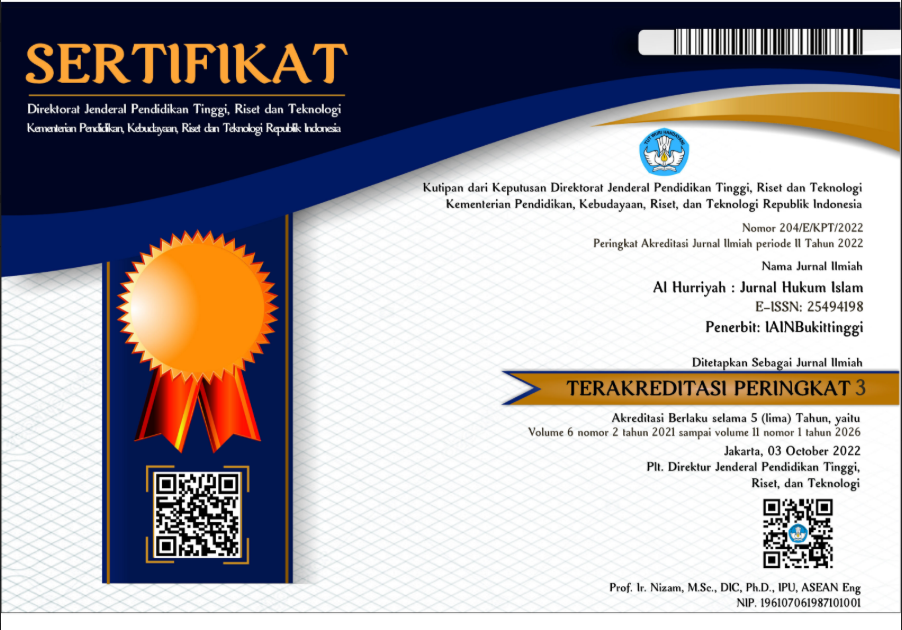Philosophical Dimensions of Punishment in Islamic Criminal Law
DOI:
https://doi.org/10.30983/alhurriyah.v6i1.3459Keywords:
Islamic criminal law, crime prevention, philosophical dimensionsAbstract
This study discusses the philosophical dimensions of punishment in terms of Islamic criminal law. Islamic criminal law has a goal that everyone does not want to commit a crime. So that Islamic criminal law is both preventive (prevention) and curative (their crimes deter the perpetrators of crimes). The formulation of the problem in this study is why people who commit crimes must be punished according to Islamic criminal law? The method used is a type of normative legal research; normative legal research is research conducted to collect and analyze secondary data. This study concludes that the provisions of the punishment contained in the Qur'an and al-Sunnah are Shari'ah that must be carried out. With this punishment, it aims to make people aware of the wickedness of evil so that it is embedded in their souls that all misdeed must be avoided whether seen by others or not, because Allah is always watching him wherever he is. When this thought is embedded in everyone, it will repress the misdeed in daily life or reduce crime in society.
Penelitian ini membahas tentang dimensi filosofis pemidanaan dilihat dari segi hukum pidana Islam. Hukum pidana Islam memiliki tujuan agar setiap orang tidak mau melakukan tindakan kejahatan. Sehingga hukum pidana Islam ini bersifat preventif (pencegahan) maupun bersifat kuratif (agar berpelaku kejahatan merasa jera dengan Tindakan kejahatannya). Rumusan masalah dalam penelitian ini adalah kenapa orang yang melakukan Tindakan kejahatan harus mendapatkan hukuman dilihat dari hukum pidana Islam? Metode yang digunakan adalah jenis penelitian hukum normatif. Penelitian hukum normatif adalah penelitian yang dilakukan untuk mengumpulkan dan menganalisis data sekunder. Kesimpulan dari penelitian ini adalah ketentuan hukuman yang terdapat dalam al-Qur’an dan al-Sunnah merupakan Syari’at yang harus dijalankan. Dengan hukuman itu bertujuan untuk menyadarkan masyarakat dari keburukan-keburukan kejahatan, sehingga tertanam di dalam jiwa bahwa semua kejahatan harus dihindari, baik dilihat oleh orang lain ataupun tidak, sebab Allah selalu mengawasinya di manapun dia berada. Apabila hal ini telah tertanam dalam diri semua orang, secara otomatis kejahatan tidak akan ada dipermukaan bumi, atau paling tidak bisa mengurangi kejahatan di tengah-tengah masyarakat.
Â
References
Al.Tirmizy, Sunan al-Tirmizi, Mesir, Musthafa al.Bab al-Halaby, 1968.
Al-‘Awa,Muhammad Salim, Fi Ushulal-Nizham al-Jinaai al-Islami, Mesir, Dar al-Ma’arif, 1983.
Al-Kahlani, Muhammad bin Ismail al-Kahlani, Subul al-Salam, Bandung, Dahlan, 1959 .
Al-Mawardi, Al Ahkam al Sulthaniyyah, Mesir, Musthafa al-Babi al-Halabi, 1973.
Al-Nawawi, Imam, Al-Majmu’ Syarh al-Muhazzab, juz 21, Beiru: Dar al-Fikr, 1996.
Al-Ramli, Nihayah al-Muhtaj Ila Syarh al-Minhaj, jilid 5. Beirut: Dar al-Fikr, 1983.
Al-Syairazi, Al-Muhazzab, juz 3. Mesir: Isa al-Babi al Halabi, t.th.
Al-Syaukani, Muhammad Ibn Muhammad Ibn Ali, Nail al-Authar, Juz. VI & VII, Mesir, Musthafa al-Babi al-Halabi, t.th.
Al-Syuyuthi, Jalal al-Din, Al-asybah wa al-Nazha’ir, Semarang, Toha Putra, t.th.
Al-Zuhaili, Wahbah, Al-Fiqh al-Islami wa adillatuhu, Juz.VI, Beirut, Dar al Fikr, 1989.
Amir, Abd. Al-Aziz, Al-Ta’zir fi al-Syari’ah al-Islami, Beirut, Dar al Fikr, 1969.
Audah, Abd. Al-Qadir, Al-Tasyri’ al-Jina’I al-Islami, Juz.I & II, Beirut, Muassasah al-Risalah, 1992.
Fitri Wahyuni, Sanksi Pidana Pemerkosaan terhadap Anak menurut Hukum Pidana Positif dan Hukum Pidana Islam, Jurnal Media Hukum, Vol. 23, No. 1, 2016.
Hamzah Hasan, Kontekstualisasi Teologi Keadilan dalam Hukum kisas, Jurnal Al Qadau, Vol. 1 No.1, 2014.
Jahroh, Siti, Reaktualisasi Tiori Hukuman dan Hukum Pidana Islam, Jurnah Hukum Islam, Volume 9, Nomor 2, 2011.
Lysa Angrayni, Hukum Pidana dalam Perspektif Islam dan Perbandingannya dengan Hukum Pidana di Indonesia, Jurnal Hukum Islam, Vol.XV, No.1, 2015.
Marsaid, Al-Fiqh al-Jinayah ( Hukum Pidana Islam ) Memahami Tindak Pidana dalam Hukum Islam, Palembang: Rafah Perss, 2020.
Otoberinsyah, Tujuan Pemidanaan Dalam Islam, Jurnal Agama dan Hak Azazi Munusia, Vol. 7, No. 2, 2018.
Rusyd,Ibn, Bidayah al-Mujtahid wa al- Nihayah al-Muqtashid, jilid 1, Mesir: Mustafa al-Babi al-Halabi, 1960.
Zahrah, Muhammad Abu, Al-Jarimah wa al-uqubah fi al-Fiqh al-Islami al-Uqubah, Beirut: Dar al-Fikr, t.th
Downloads
Published
How to Cite
Issue
Section
Citation Check
License
Authors who publish with this journal agree to the following terms:
- Authors retain copyright and grant the journal right of first publication with the work simultaneously licensed under a Creative Commons Attribution-ShareAlike 4.0 International License that allows others to share the work with an acknowledgment of the work's authorship and initial publication in this journal.
- Authors are able to enter into separate, additional contractual arrangements for the non-exclusive distribution of the journal's published version of the work (e.g., post it to an institutional repository or publish it in a book), with an acknowledgment of its initial publication in this journal.
- Authors are permitted and encouraged to post their work online (e.g., in institutional repositories or on their website) prior to and during the submission process, as it can lead to productive exchanges, as well as earlier and greater citation of published work (See The Effect of Open Access).





